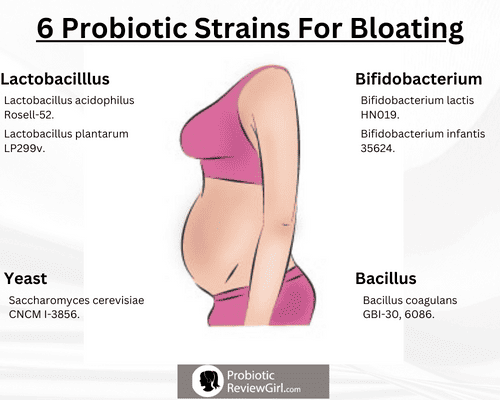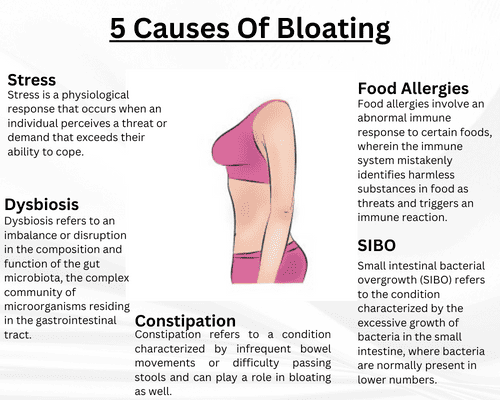Do Probiotics Help With Bloating?
Probiotics can help improve symptoms of bloating in patients with functional bowel disorders. A 2011 study authored by T Ringel-Kulk, found the probiotic strains Lactobacillus acidophilus NCFM and Bifidobacterium lactis Bi-07, when taken twice a day, improved symptoms of bloating in patients with functional bowel disorders.
Functional bowel disorders refer to a group of gastrointestinal conditions characterized by chronic and recurring symptoms, such as abdominal pain, bloating, and altered bowel habits, without any apparent structural or biochemical abnormalities.
Bloating is a condition characterized by a feeling of fullness and tightness in the abdomen, often caused by the accumulation of gas or air in the gastrointestinal tract.
Probiotics are live bacteria or yeasts that are beneficial for the digestive system and overall health when consumed in adequate amounts, helping to restore and maintain a healthy balance of gut bacteria.
What Probiotic Strains For Bloating?
Below, is a graphic of six probiotic strains that have shown promising results in clinical research specifically related to bloating as a symptom.

The 6 strains are, Lactobacillus acidophilus Rosell-52, Lactobacillus plantarum LP299v, Bifidobacterium lactis HN019, Bifidobacterium infantis 35624, Bacillus coagulans GBI-30, 6086 and Saccharomyces cerevisiae.
These strains are strain-specific, making it easier to obtain them through supplements rather than relying on probiotic foods such as yogurt, kimchi, sauerkraut, and kombucha.
- 1Lactobacillus acidophilus Rosell-52: A study conducted in 2006 by Benes, Z, found that L. acidophilus Rosell-52 demonstrated potential in alleviating symptoms of irritable bowel syndrome, including bloating, after a period of four months.
- 2Lactobacillus plantarum LP299v: A 2001 study authored by K Niedzielin, found that L. plantarum 299V had a beneficial effect in patients with irritable bowel syndrome, resulting in the resolution of abdominal pain in all treated patients, improved stools frequency in constipated patients, and a significant improvement in overall IBS symptoms compared to the placebo group.
- 3Bifidobacterium lactis HN019: A 2001 study authored by A Ibarra, on adults with functional constipation, found there were no statistically significant differences in the outcomes related to bloating between the groups receiving B. lactis HN019 supplementation and the placebo group. It helped with constipation which can assist with bloating caused by constipation.
- 4Bifidobacterium infantis 35624: A 2006 study authored by PJ Whorwell, found that B. infantis 35624 at a dosage of 1 x 10(8) cfu/mL was significantly superior to placebo and other bifidobacterium doses in relieving symptoms of abdominal pain, bloating, bowel dysfunction, incomplete evacuation, straining, and the passage of gas in women with irritable bowel syndrome.
- 5Bacillus coagulans GBI-30, 6086: A 2006 study authored by L Hun, found that Bacillus coagulans GBI-30, 6086, a probiotic, significantly improved abdominal pain and bloating in patients with irritable bowel syndrome over an 8-week period, showing it may be a safe and effective option for symptom relief in IBS.
- 6Saccharomyces cerevisiae CNCM I-3856: A 2016 study authored by R Spiller, found that supplementation with Saccharomyces cerevisiae I-3856, a probiotic yeast, did not provide overall benefit for symptoms and well-being in individuals with irritable bowel syndrome Subgroup analysis revealed a significant improvement in gastrointestinal symptoms, specifically abdominal pain/discomfort and bloating, in individuals with predominant constipation (IBS-C) compared to the placebo group.
How long does it take probiotics to work for bloating?
It takes around 28 days for probiotics to start working for cases of bloating caused by function bowel disorders. In the previously shared 2011 study authored by T Ringel-Kulk, probiotics showed a significant reduction in abdominal bloating severity at 4 weeks (28 days) and 8 weeks (56 days) compared to the placebo group.
What Causes Bloating?
Bloating can be caused by stress, dysbiosis (imbalanced gut bacteria), food allergies, SIBO (excessive bacteria in the small intestine), and constipation. Stress affects digestion and gut bacteria, while dysbiosis disrupts digestion and increases gas production.
Food allergies cause inflammation and digestive disturbances. SIBO leads to excessive gas production in the small intestine. Constipation results in stool accumulation and gas buildup. Below are 5 causes of bloating in a graphic and then in further detail.

1. Stress
Stress is a physiological response that occurs when an individual perceives a threat or demand that exceeds their ability to cope. In relation to bloating, stress can play a role through various mechanisms.
Stress can alter gastrointestinal motility, leading to changes in the movement of food and gas through the digestive system, which can contribute to bloating according to PC Konturek.
Stress can disrupt the balance of gut microbiota, affecting the composition and function of the intestinal bacteria, potentially leading to bloating and other gastrointestinal symptoms according to A Madison.
Stress can modulate visceral sensitivity, making individuals more prone to perceive normal sensations, such as gas or distension, as bloating according to M Larauche.
2. Dysbiosis
Dysbiosis refers to an imbalance or disruption in the composition and function of the gut microbiota, the complex community of microorganisms residing in the gastrointestinal tract.
In the context of bloating, dysbiosis can play a role by altering the normal fermentation and digestion processes in the gut. Dysbiosis can also contribute to intestinal inflammation and increased intestinal permeability, which may further exacerbate bloating symptoms according to AK DeGruttola.
Imbalances in beneficial and harmful bacteria can lead to increased gas production and impaired digestion, resulting in bloating and discomfort according to YJ Zhang.
3. Food Allergies
Food allergies involve an abnormal immune response to certain foods, wherein the immune system mistakenly identifies harmless substances in food as threats and triggers an immune reaction.
In the context of bloating, when an individual with a food allergy consumes an allergenic food, it can lead to inflammation and irritation in the gastrointestinal tract.
This inflammatory response can disrupt normal digestive processes, impair nutrient absorption, and cause increased gas production, resulting in bloating and abdominal discomfort according to D Gargano.
4. SIBO
Small intestinal bacterial overgrowth (SIBO) refers to the condition characterized by the excessive growth of bacteria in the small intestine, where bacteria are normally present in lower numbers.
In relation to bloating, SIBO can play a significant role since the overgrowth of bacteria in the small intestine leads to the fermentation of undigested carbohydrates, producing excessive amounts of gas, particularly hydrogen and methane. This gas accumulation can cause abdominal bloating, distension, and discomfort according to AH Sachdev.
5. Constipation
Constipation refers to a condition characterized by infrequent bowel movements or difficulty passing stools and can play a role in bloating as well.
When stool remains in the colon for an extended period, excessive water absorption occurs, resulting in hardened and dry stools. The accumulation of fecal matter in the intestines can cause abdominal bloating and discomfort. Sluggish movement of stool through the digestive tract can lead to increased gas production, contributing to bloating.
5 factors can contribute to constipation, including inadequate fiber intake, dehydration, sedentary lifestyle, certain medications, and underlying medical conditions. Managing constipation involves lifestyle modifications such as increasing fiber and fluid intake, regular exercise, and establishing a consistent bowel routine.
How To Relieve Bloating?
To relieve bloating, it's important to consider diet and lifestyle factors according to the NHS. Avoid overeating and chew food thoroughly to reduce air intake. Test for allergies and intolerances and consider a low-FODMAP diet to address potential triggers. Reduce sugar intake, as it can feed harmful bacteria in the gut. Manage stress, as it affects the gut and digestion.
Dr. Sara Mesilhy has a Master’s degree in Gastroenterology and holds a membership with the Royal College of Physicians of the United Kingdom. She completed her Bachelor of Medicine, Bachelor of Surgery (MBBS) at Cairo University and is currently part of the ProbioticReviewGirl medical team.